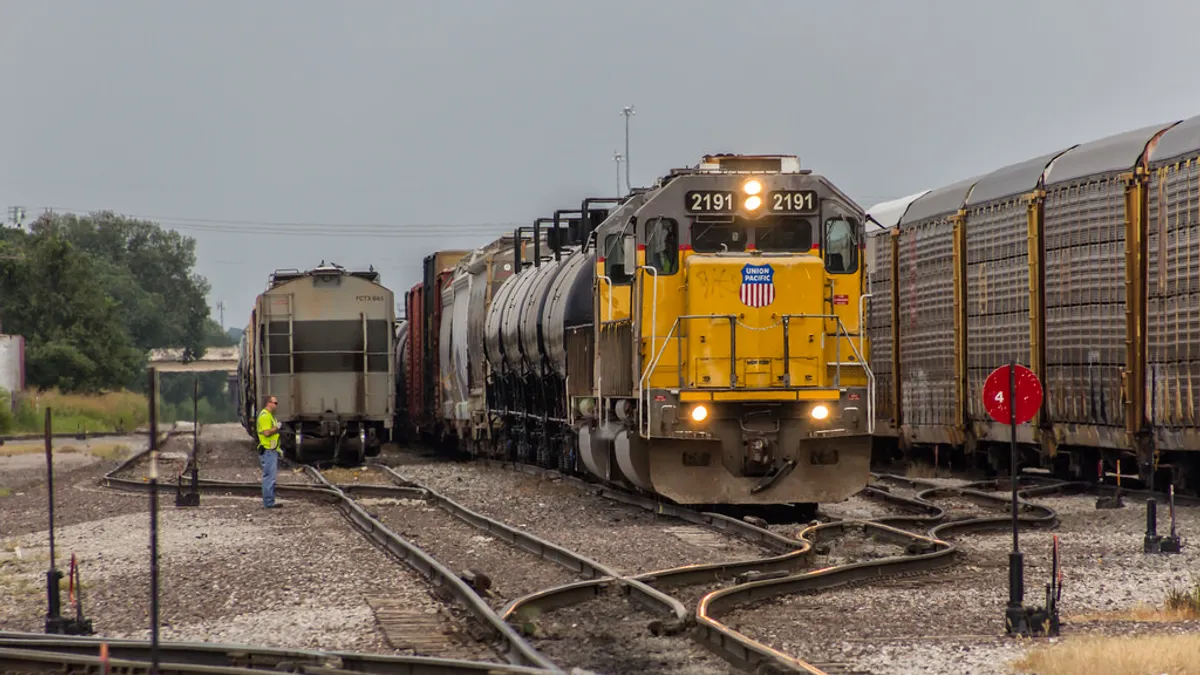Dive Brief:
- Twenty-eight railroad projects will receive $203.7 million in grants from the Federal Railroad Administration (FRA) to fund positive train control (PTC) implementation, as nine railroads remain at risk for missing the Dec. 31, 2018 deadline, the agency announced last week.
- The FRA reported that as of June 30, 15 of the 40 railroads with PTC obligations were at 100% implementation; 12 have installed 95 to 99% of all hardware; and all railroads except for one that will use systems employing radio spectrum have secured sufficient radio spectrum, according to an FRA status update.
- The nine at-risk railroads own or control approximately 665 route miles or approximately 1.1% of the total route miles subject to the PTC mandate.
Dive Insight:
The nation's major freight and passenger railroads face a looming deadline to implement positive train control, systems designed to stop trains automatically before some types of accidents can occur.
This round of grants will fund various aspects of PTC implementation for intercity passenger or commuter rail and freight rail transportation including back office PTC systems; wayside, communications, and onboard PTC system equipment; personnel training; PTC system testing; and interoperability.
The 28 projects in 15 states represent $203 million of the $250 million appropriated under the Consolidated Appropriations Act of 2018 for the implementation of PTC systems, via the Consolidated Rail Infrastructure and Safety Improvements (CRISI) program. An additional $46 million is expected to be appropriated soon, the FRA said.
"The railroads have achieved some significant improvements over the past year implementing this safety technology," FRA Administrator Ronald L. Batory said in the announcement. "While we are seeing progress among a majority of railroads, we want to see everyone meet their requirements."
The FRA called the progress so far a "significant improvement" from December 2016, when PTC hardware was installed on only 16% of required tracks for freight railroads and 24% for passenger railroads.
The American Public Transportation Association said earlier in August it was optimistic that members would meet the deadlines for implementing the safety systems.
Railroads must demonstrate that a PTC system has been fully implemented by Dec. 31, 2018, unless they fulfill the requirements for an alternative schedule, which provides a reprieve until 2020 at the latest.
So far, 14 railroads have qualified for the alternative schedule with sufficient revenue service demonstrations (RSD) or by meeting other substitute criteria. Those railroads with PTC systems that meet the RSD criteria or are in operation comprise approximately 37,705 route miles or 65% of the nearly 58,000 route miles that are subject to the statutory mandate.
The nine railroads still at risk according to FRA are New Mexico Rail Runner Express (Rio Metro), Capital Metropolitan Transportation Authority (Austin, TX), New Jersey Transit, Altamont Corridor Express, Maryland Area Regional Commuter, Trinity Railway Express (Dallas – Fort Worth, TX), South Florida Regional Transportation Authority, Peninsula Corridor Joint Powers Board (Caltrain) and Central Florida Rail Corridor (SunRail). The only railroad that has not acquired the required spectrum is Rio Metro.
The low quality of some railroads' PTC safety plans is taxing the FRA's resources due to the time required to review and correct them, according to the FRA's presentation at the third PTC symposium.













